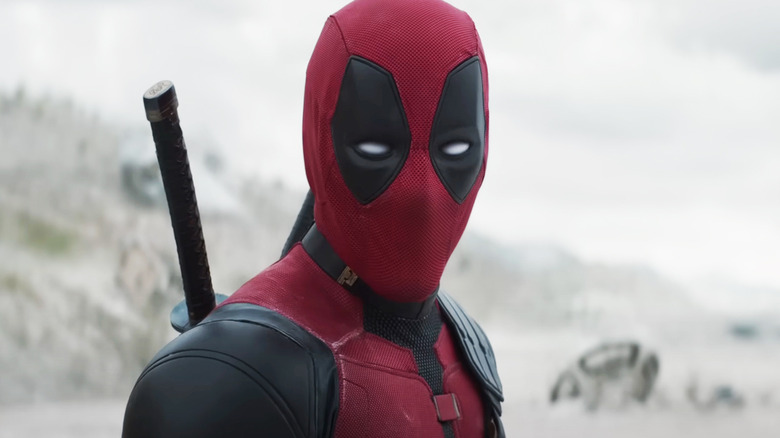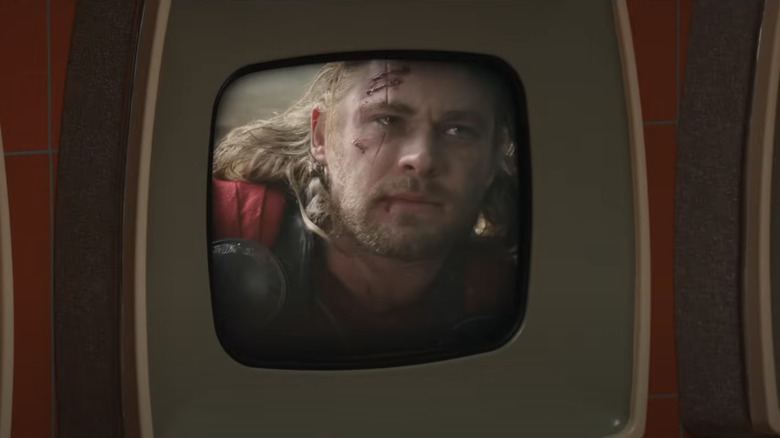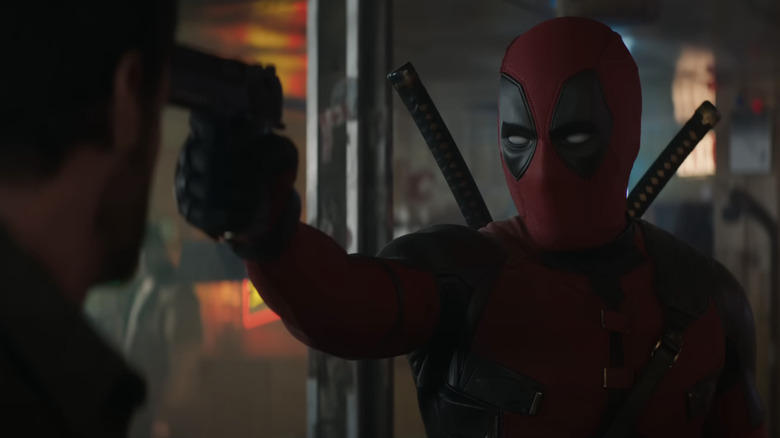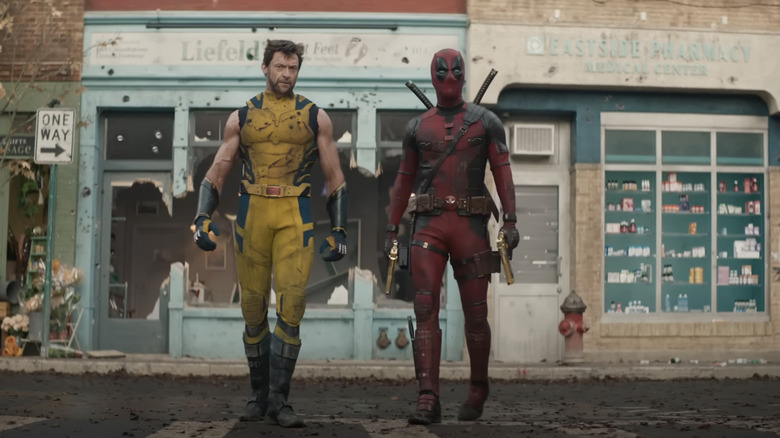Why Deadpool & Wolverine Doesn't Set Up Future Marvel Cinematic Universe Movies
It's no secret that the Marvel Cinematic Universe has been enduring somewhat of a crisis in recent years. In simple terms, it got to the point where we simply had too much of the MCU and it was getting ridiculous (as were the box office profits, which had plummeted in the age of Marvel ubiquity). But aside from the fact that the films and streaming series had become far too numerous, one of the biggest criticisms of modern MCU movies was that many of them seemed designed as mere vehicles to set up the next installment in the gargantuan franchise, sacrificing story and character in favor of furthering the shared universe enterprise itself.
Thankfully, though, a savior has arrived in the form of Ryan Reynolds, whose "Deadpool & Wolverine" has made well over a billion dollars and seemingly proved that there is life in the MCU yet. While it's too early to say whether this really is a turning point for Marvel Studios and its increasingly beleaguered saga, there's absolutely no doubt that Reynolds and his foul-mouthed hero have given fans, and studio head Kevin Feige, hope.
Where this gets interesting for anyone following the MCU story is when you look at how Reynolds and "Deadpool & Wolverine" director Shawn Levy did it. One way of looking at the movie is as a full-on embrace of everything that seemingly brought the MCU to a standstill: the endless fan service, gimmicks over story and character, incessant wisecracks. These were the elements that fans had ostensibly rejected prior to the Merc with the Mouth's latest outing, and yet, here we are. "Deadpool & Wolverine" is the highest-grossing R-rated movie of all time and the MCU is back.
Leaving aside the question of how Reynolds and co. managed to pull off this trick for now, there is yet another layer to this fascinating paradox. Despite indulging everything that had degraded MCU movies over the past few years and coming out on top regardless, it seems there was one specific element of those films that the "Deadpool & Wolverine" crew were intent upon leaving out.
Deadpool & Wolverine doesn't set up any other MCU movies
Even before 2019's "Avengers: Endgame," but especially after, MCU movies often seemed to be little more than an excuse to set up the next installment in the franchise. This was one of the major issues with the property, especially at a time when Marvel was pumping out so much "content" that setting up the next MCU product just didn't come with the same thrill as it did when the movies were few and far between and audiences knew they had to wait to find out exactly what the post-credit clip meant for the shared universe.
For "Deadpool & Wolverine" director Shawn Levy, this seems to be an issue to which he was acutely aware. Indeed, the movie's only foreshadowing appears to come in the form of a cryptic glimpse at a future moment where Deadpool dies in a crying Thor's arms. What's more, the post-credit scene is just the conclusion of a joke about Chris Evans' Johnny Storm badmouthing villain Cassandra Nova (Emma Corrin), with no teasing of forthcoming MCU developments in-sight. Asked by The New York Times about the lack of set-ups, Levy replied:
"It was a founding principle of this movie, so fundamental to our intent that in early versions of the opening voice-over, he actually says, 'Let me just say right now, this is a Marvel movie that isn't a commercial for any other Marvel movies.' The commitment to a self-contained, single story was bedrock for Ryan [Reynolds] and me, and never once was there an ounce of pushback from Marvel."
Again, it's surprising to hear that this was such a sticking point for Levy and Reynolds, who otherwise packed their movie with as many crowd-pleasing moments as possible. But if you think about it, staying somewhat removed from the MCU at this stage makes a lot of sense for Deadpool.
Deadpool & Wolverine's lack of MCU influence makes sense
"Deadpool & Wolverine" is the Merc with the Mouth's big MCU debut. Disney acquired Fox's movie and TV assets back in 2019 and gained Deadpool as part of the deal, leading many to wonder how the Mouse would integrate the R-rated shenanigans of Ryan Reynolds' hero into the comparatively family-friendly MCU. As such, anticipation was already high for "Deadpool & Wolverine." But when it was announced that Hugh Jackman would be coming out of Logan retirement to reprise his most recognizable role, that anticipation went into overdrive.
In the run up to the film's release, we learned more about how "Deadpool & Wolverine" would tell a multiversal storyline, integrating cameos from many of the erstwhile 20th Century Fox X-Men characters and potentially having major consequences for the in-universe storyline going forward. But if you take a step back and think about it for a second, you'll quickly realize that absolutely nothing changes in terms of the MCU by the end of "Deadpool & Wolverine." Jackman's Wolverine and Dafne Keen's X-23 are now in Deadpool's own universe, which was saved from extinction during the course of the movie; Cassandra Nova is gone, the events that occurred in the Void have no bearing on the wider MCU, and that's pretty much it.
There's the faint whiff of market testing here. If you're Kevin Feige, you stand to benefit from a situation whereby if "Deadpool & Wolverine" becomes a hit, Marvel can decide to bring the character and his crew into the MCU proper, along with Wolverine and X-23. On the other hand, if the film didn't perform as expected, then nothing has changed and Marvel/Disney can start working on a new way to reinvigorate their franchise. It makes sense, even if it is yet another example of how, when it comes to Marvel, the business side contorts the stories being told in an even more significant way than usual in Hollywood.
Shawn Levy wanted to make a crowd-pleaser
In terms of why there's little to no foreshadowing in "Deadpool & Wolverine," aside from the likelihood that Kevin Feige was eager to keep Deadpool on a short leash for his first MCU outing, there's also the fact that Shawn Levy seemed to take seriously the idea of making as crowd-pleasing a movie as possible. That meant that not only was too much foreshadowing off the table, but also Levy didn't want his viewers to have to do any homework coming into the experience. As the director put it in an interview prior to the film's release:
"I was a good student in school. I'll do my homework as an adult. But I am definitely not looking to do homework when I go to the movies. I very much made this film with certainly a healthy respect and gratitude towards the rabid fan base that has peak fluency in the mythology and lore of these characters and this world. But I didn't want to presume that. This movie is built for entertainment, with no obligation to come prepared with prior research."
With that in mind, it makes sense for Levy to have left out the usual post-credit teases and allusions to forthcoming movies, which became one of the more tedious aspects of the MCU prior to the arrival of "Deadpool & Wolverine." The director also referred to the movie as being "built for audience delight," and yet more foreshadowing might well have detracted from that.
That said, now that "Deadpool & Wolverine" has obliterated the box office, Marvel and Disney will surely look for ways to bring the character into the MCU in a more significant way moving forward.
"Deadpool & Wolverine" is currently playing in theaters.



